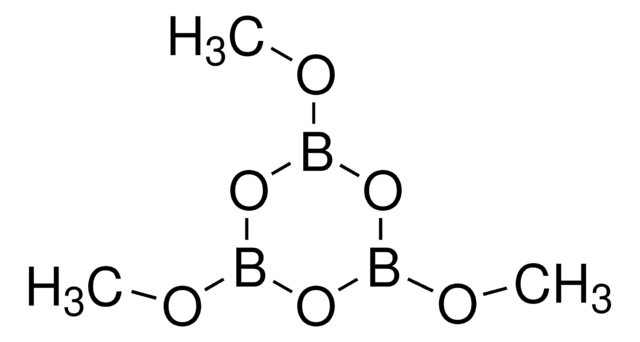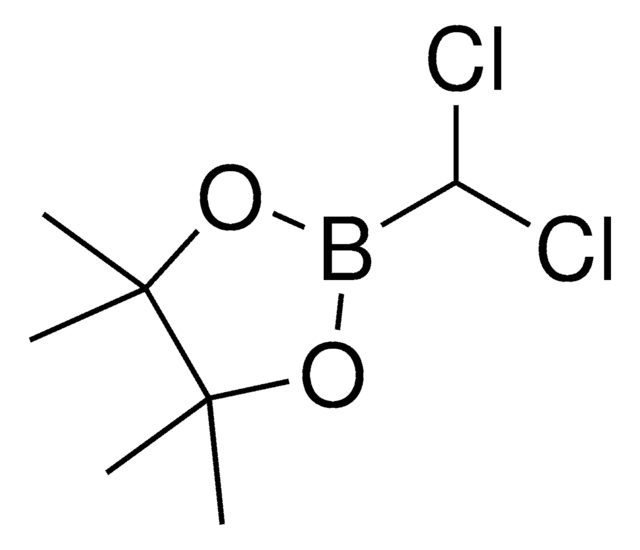903965
Trimethylboroxine
50% THF solution
Synonym(s):
2,4,6-Trimethyl-1,3,5,2,4,6-trioxatriborinane, 2,4,6-Trimethylboroxine, Methaneboronic anhydride, Trimethyl-1,3,5,2,4,6-trioxatriborinane
Sign Into View Organizational & Contract Pricing
All Photos(1)
About This Item
Empirical Formula (Hill Notation):
C3H9B3O3
CAS Number:
Molecular Weight:
125.53
MDL number:
UNSPSC Code:
12352103
NACRES:
NA.22
Recommended Products
form
liquid
refractive index
n/D 1.3880
density
0.89962 g/mL
InChI
1S/C3H9B3O3/c1-4-7-5(2)9-6(3)8-4/h1-3H3
InChI key
GBBSAMQTQCPOBF-UHFFFAOYSA-N
Application
Trimethylboroxine (TMB) is a cyclic anhydride of methyl-boronic acid. It can be used as a:
- Methylating agent for the methylation of various aromatic halides and C(sp3)−H bonds using palladium catalyst.
- Reagent in the preparation of polymer supported CBS (Corey, Bakshi, and Shibata) catalysts.
related product
Product No.
Description
Pricing
Signal Word
Danger
Hazard Statements
Precautionary Statements
Hazard Classifications
Carc. 2 - Flam. Liq. 2 - Skin Corr. 1B - STOT SE 3
Target Organs
Respiratory system
Supplementary Hazards
Storage Class Code
3 - Flammable liquids
WGK
WGK 3
Flash Point(F)
-5.8 °F
Flash Point(C)
-21 °C
Choose from one of the most recent versions:
Already Own This Product?
Find documentation for the products that you have recently purchased in the Document Library.
Oxazaborolidines as functional monomers: ketone reduction using polymer-supported Corey, Bakshi, and Shibata catalysts.
Price MD, et al.
The Journal of Organic Chemistry, 67(23), 8086-8089 (2002)
Profound Methyl Effects in Drug Discovery and a Call for New C−H Methylation Reactions.
Schoenherr H and Cernak T
Angewandte Chemie (International ed. in English), 52(47), 12256-12267 (2013)
Practical methylation of aryl halides by Suzuki-Miyaura coupling.
Gray M, et al.
Tetrahedron Letters, 41(32), 6237-6240 (2000)
Jacob B Geri et al.
Journal of the American Chemical Society, 139(29), 9811-9814 (2017-07-14)
We present a strategy to rationally prepare CF3- transfer reagents at ambient temperature from HCF3. We demonstrate that a highly reactive CF3- adduct can be synthesized from alkali metal hydride, HCF3, and borazine Lewis acids in quantitative yield at room
Anne Rietz et al.
Journal of medicinal chemistry, 60(11), 4594-4610 (2017-05-10)
Spinal muscular atrophy (SMA) is the leading genetic cause of infant death. We previously developed a high-throughput assay that employs an SMN2-luciferase reporter allowing identification of compounds that act transcriptionally, enhance exon recognition, or stabilize the SMN protein. We describe
Our team of scientists has experience in all areas of research including Life Science, Material Science, Chemical Synthesis, Chromatography, Analytical and many others.
Contact Technical Service
![[1,1′-Bis(diphenylphosphino)ferrocene]dichloropalladium(II)](/deepweb/assets/sigmaaldrich/product/structures/130/734/8846aa26-1858-458a-998d-8c306c13bf0f/640/8846aa26-1858-458a-998d-8c306c13bf0f.png)



![[1,1′-Bis(diphenylphosphino)ferrocene]dichloropalladium(II), complex with dichloromethane](/deepweb/assets/sigmaaldrich/product/structures/825/986/4317978b-1256-4c82-ab74-6a6a3ef948b1/640/4317978b-1256-4c82-ab74-6a6a3ef948b1.png)







